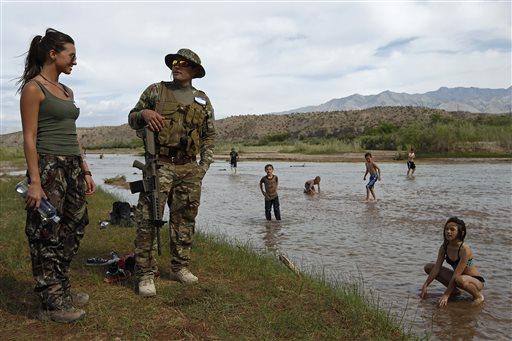In society, laws are only as meaningful as much as they are enforced. For the past 20 years, the federal government has had a dispute with Nevada rancher Cliven Bundy over his use of public lands without paying for them.
Recently, many came to support Bundy in his standoff against the government because all people saw was a large armed police force against an old rancher.
Students should investigate the story for what it is instead of what it appears to be. After delving deeper into the story, it seems that the feds are not in the wrong as much as everyone thought or hoped.
On top of using federal lands for 20 years without paying for them, Bundy ignored a court order to vacate the land in 1998 after losing his inheritance claim in United States vs. Bundy. The federal government’s response should not be shocking or controversial.
Regardless of what Bundy and the so- called “patriots” who came with guns to defend Bundy believe, we live in a modern society that is ruled by laws. These patriots believe the government overstepped its bounds, but what is the federal government supposed to do in a situation where someone will not pay what is owed.
I disagree that it was excessive to send hundreds of agents to the Bundy Ranch. The U.S. Constitution grants the federal government authority over all the lands, especially land owned by the federal government. The federal government owns land for the commons, and what Bundy is trying to do in the standoff is indirectly force the government to privatize the land by limiting the authority of the federal government.
The reason the feds came armed is the same reason most government enforcement agents carry arms — protecting themselves and enforcing the law. To cherry pick certain details on the management of whether to bring snipers or not is irrelevant since clearly force was needed when armed right-wing militia forces arrived.
The scary part about the Bundy Standoff isn’t the standoff itself, but what it represents. Conservatives, especially fringe elements, dislike the federal government and have a twisted view of history to justify politics today.
Many consider the Bundy Standoff a modern day reflection of the Founding Fathers rebelling over taxes. The problem with this analogy is that the founders fought for a revolution because they had no say in taxation, hence the phrase “taxation without representation.”
This is why the Whiskey Rebellion under George Washington’s presidency was discredited and ended as soon as Washington’s army arrived. The taxes they rebelled against were passed not by the king’s parliament, but by the people’s representatives in Congress.
Although Harry Reid is wrong to call the right wing militia a “domestic terrorist” group, that doesn’t absolve the militia. Along with their supporters, they are limiting the authority of democratic institutions and may even make our society look more like Ukraine if far right-wing factions continue to grow in influence.
Many also want to use this standoff as the perfect jumping-off point to justify limiting the government’s authority. This isn’t what the founders wanted, wrote about or intended when they stripped the enumerated powers from the king and gave them to Congress in the Constitution.
Without laws and a government enforcing them, we lose the rule of law. Conservatives should look to third world countries to see what happens when there is no rule of law. What Bundy and the patriots are doing is wrong, and people shouldn’t use their twisted cause to justify another right wing attempt to discredit the government, which regardless of us liking it or not, is in the right.
Joshua Hajiakbarifini is a 24-year-old political science and economics senior from Baton Rouge.
Opinion: No, because if laws are not enforced then they are not laws at all
April 21, 2014

Jennifer Scalzo, left, and her husband Anthony Scalzo stand by the Virgin River during a rally in support of Cliven Bundy near Bunkerville, Nev. Friday, April 18, 2014. (AP Photo/Las Vegas Review-Journal, John Locher)
More to Discover







